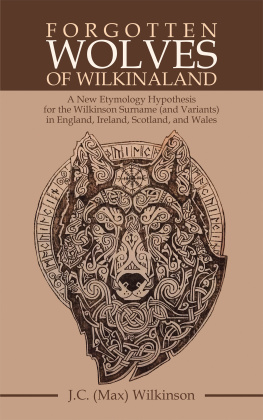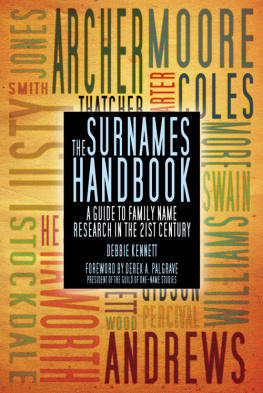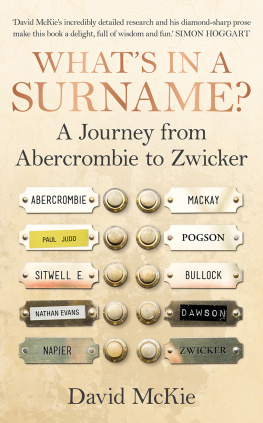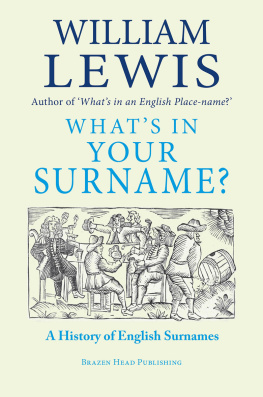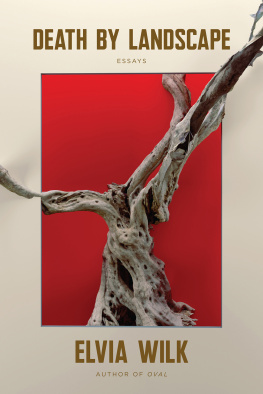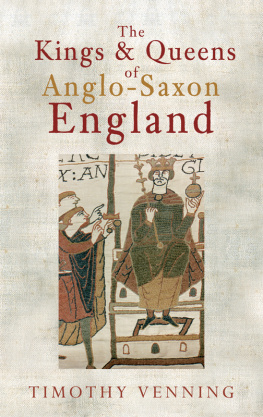J.C. Wilkinson - Forgotten Wolves of Wilkinaland: A New Etymology Hypothesis for the Wilkinson Surname (And Variants) in England, Ireland, Scotland, and Wales
Here you can read online J.C. Wilkinson - Forgotten Wolves of Wilkinaland: A New Etymology Hypothesis for the Wilkinson Surname (And Variants) in England, Ireland, Scotland, and Wales full text of the book (entire story) in english for free. Download pdf and epub, get meaning, cover and reviews about this ebook. year: 2020, publisher: Archway Publishing, genre: Science fiction. Description of the work, (preface) as well as reviews are available. Best literature library LitArk.com created for fans of good reading and offers a wide selection of genres:
Romance novel
Science fiction
Adventure
Detective
Science
History
Home and family
Prose
Art
Politics
Computer
Non-fiction
Religion
Business
Children
Humor
Choose a favorite category and find really read worthwhile books. Enjoy immersion in the world of imagination, feel the emotions of the characters or learn something new for yourself, make an fascinating discovery.
- Book:Forgotten Wolves of Wilkinaland: A New Etymology Hypothesis for the Wilkinson Surname (And Variants) in England, Ireland, Scotland, and Wales
- Author:
- Publisher:Archway Publishing
- Genre:
- Year:2020
- Rating:5 / 5
- Favourites:Add to favourites
- Your mark:
Forgotten Wolves of Wilkinaland: A New Etymology Hypothesis for the Wilkinson Surname (And Variants) in England, Ireland, Scotland, and Wales: summary, description and annotation
We offer to read an annotation, description, summary or preface (depends on what the author of the book "Forgotten Wolves of Wilkinaland: A New Etymology Hypothesis for the Wilkinson Surname (And Variants) in England, Ireland, Scotland, and Wales" wrote himself). If you haven't found the necessary information about the book — write in the comments, we will try to find it.
The prevailing explanation that all forms of Wilk/Wilkin beginning surnames being variants of diminutive for William or son of diminutive for Williamand the presumption that this is of Norman in originis simply not accurate.
J.C. (Max) Wilkinson presents this provocative thesis in his book, challening an etymological presumption that is seemingly ubiquitous, woefully incomplete, and arguably almost totally wrong for the vast majority of Wilk root surname lineages.
Instead, he submits that there are persuasive reasons rooted in mytho-history and period literature from the Anglo-Saxon and Norse traditions supporting an ethno-linguistic heritage from the Slavic Wylte/Weleti/Wilzi tribe. This tribe, assimilated into the Frisian and Danish dark age kingdoms, is ultimately the source of the Wilk root surnames in the British Isles and Ireland, as well as in the northern continental antecedent locations (i.e. Denmark, Frisia and Pomerania) whose migrations and invasions brought these names to England, Wales, Scotland and Ireland.
Join the author as he seeks to unravel the origins of his own family name and strives to provide answers for his children as well as for future generations of all families bearing Wilk root surnames.
Family piety and a deep knowledge of history are too often missing in 21st-century America, and we suffer as a result. I hope Max Wilkinsons explorations of his family roots, which are now woven now into the rich tapestry that is the United States, inspires others to undertake similar journeys.
George Weigel, Bestselling author of
Witness to Hope: The Biography of John Paul II
[The] trail... has now been blazed.... [T]his first-rate new analysis Forgotten Wolves of Wilkinaland.... deftly leads the reader on a scientifically and historically based journey to where the name Wilkinson originated ... Wilkinson traces... with amazing precision and compelling evidence back 1,500 years... journey[ing] through ancient European tribes... to Norsemen to Scotsmen, Irishmen and eventually Americans. Wilkinson wrote his book to help his children understand... their roots .... [and] he has provided us all with a unique opportunity to learn the origins of our roots and our name.
Dave Wilkinson, author of
Those Audacious Wilkinson Brothers
J.C. Wilkinson: author's other books
Who wrote Forgotten Wolves of Wilkinaland: A New Etymology Hypothesis for the Wilkinson Surname (And Variants) in England, Ireland, Scotland, and Wales? Find out the surname, the name of the author of the book and a list of all author's works by series.

